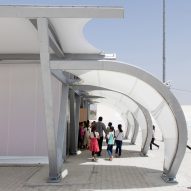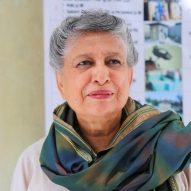Nigerian startup AllSpace has been recognised by each the Swarovski Basis’s Creatives for Our Future programme and The World Round’s Younger Local weather Prize for its prototypes for modular shelters.
AllSpace has created inexpensive, easy-to-assemble buildings to handle the rising refugee disaster worldwide, basing the design on vernacular varieties constituted of on-hand and recycled supplies, together with aluminium, tarpaulin and 3D-printed plastic parts.
“It appears like the standard Nigerian conventional African structure, like hearts with the home windows, cross air flow and all the things,” AllSpace founder Blossom Eromsele instructed Dezeen.
“So I believe for them, it simply felt extra like house. It was simpler for them to just accept that sort of type.”

Eromsele has launched two prototypes in Nigeria, and stated that everything of the construction, together with logistics, prices solely $120 {dollars} and every construction takes about 4 hours to assemble.
She highlighted the significance of well-ventilated buildings that may very well be rapidly assembled to reply to a disaster, including that the shelters may very well be occupied for so long as two years and preserve their integrity.
The shelters include solar-power capabilities and have a hexagonal form constructed on a mud-based platform that may be organized to create communal areas or household groupings.

Two layers of tarpaulin and dried grass are used for insulation of the modular shelters, that are created by Eromosele and a small staff directed by her in Nigeria.
Eromosele’s mission was amongst a cohort of younger designers chosen for the Swarovski Basis’s programme, supported by United Nations Workplace for Partnerships.
The programme leverages funds and sources to spotlight and produce to fruition initiatives by individuals working in areas in want of sustainable improvement.
The Swarovski Basis programme additionally highlighted 5 different younger designers addressing social and environmental points.
These included Indian designer Mangesh Kurund, who created a 3D-printed “biocladding” that’s designed particularly to domesticate moss and algae. This know-how references pure textures, reminiscent of animal pores and skin, and is built-in with organic matter to assist the expansion.

It was designed in an try to assist scale back city warmth sinks and to deliver nature into town, Kurund instructed Dezeen.
Additionally a part of the programme was a organic dye derived from vegetation grown in polluted areas by UK designer Aurelie Fontan.
Indonesian designer Azra Firmansyah created a wearable system that interprets sound into vibrations to help deaf and hearing-impaired individuals within the enjoyment of music.
Egyptian designer Moemen Sobh created textiles from ocean waste, and US-based Barimah Asare designed an exterior graphics card to cut back e-waste by extending the lifecycle of computer systems.
AllSpace was additionally named a Younger Local weather Prize Winner by the non-profit group The World Round, which highlighted how Eromsele’s designs supply “dignified shelter in a sustainable method.”
The group’s Younger Local weather Prize was launched in 2022.
Different interventions by architects into shelters embrace Kengo Kuma’s design for refugee camps after the Turkey-Syria earthquake.
The imagery is courtesy of Swarovski Basis.
The submit AllSpace creates modular refugee shelters from recycled supplies appeared first on Dezeen.
















